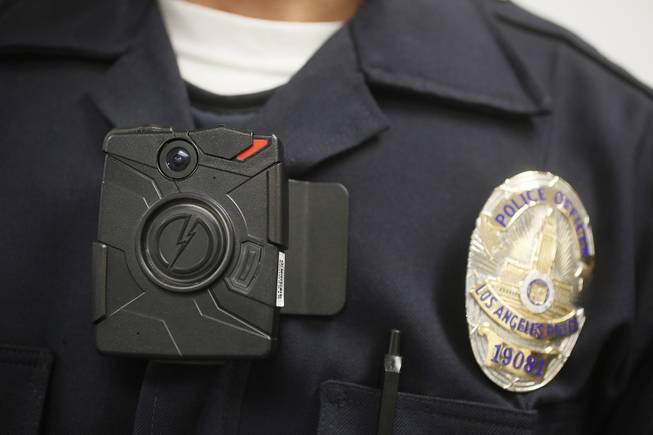
AP Photo/Damian Dovarganes
A Los Angeles Police officer is shown with an on-body camera during a demonstration for media in Los Angeles, Jan. 15, 2014. Thousands of police agencies have equipped officers with cameras on their uniforms, but they’ve frequently lagged in setting policies on how they’re used.
Friday, March 14, 2014 | 2 a.m.
How's this for a double-edged sword — there's a chance those on-body cameras Metro Police officers are getting ready to wear this year could lead to more tickets for petty offenses.
As Metro prepares to launch a pilot program outfitting 400 officers with the gadgets, researchers are considering ways to analyze their effect on interactions between police and civilians. Among those researchers is Bill Sousa, a professor of criminal justice at UNLV who says anecdotal evidence from previous studies suggests the cameras can bring unexpected results — for example, the adoption of a legalistic policing style and an eventual uptick in citations for minor infractions.
A Metro spokesman said the department had not set a launch date for the delayed pilot program, which initially was scheduled to start by February in the northeast valley and in west Las Vegas.
In a conversation with the Sun, Sousa discussed questions commonly raised when examining on-body camera use:
What questions might the pilot program and its academic study answer? What will the cameras do?
Without going into the specifics of (Metro’s program), essentially there are a few questions that academic studies try to answer overall. Some of the outcome measures that people are interested in are whether the body cameras reduce officer misconduct and whether the cameras reduce officer use of force. Those are two of the big questions that are out there. This isn't just for Metro; this is any of the places that are considering adopting the cameras.
It's interesting, because when we say body cameras reduce officer misconduct, normally we measure that by the number of complaints that citizens register against officers. What we're seeing in some preliminary results in other parts of the country is that the cameras do reduce complaints of officer misconduct, but it's sort of unclear if it's because officers are behaving better or because the citizens are behaving better on camera.
Once Metro's project gets rolling, these are the things we've talked about looking at.
Does existing research prove cameras reduce officer misconduct?
We don't really know for sure, but there is more or less anecdotal evidence saying they do.
The question is, what's the mechanism? Is it that the officers themselves are behaving more because they know they're being recorded? Or is it that citizens are less likely to falsely accuse officers of misconduct because they themselves know they're being recorded?
How can one discern who is behaving differently — the cops or the citizens they interact with?
It would be difficult. It's part of the difficulty with some of the social sciences. It might involve doing surveys with citizens, or it might involve doing surveys with officers. At some point we might even possibly look at some of the video interaction between officers and citizens, and see if citizens change their behavior in the presence of the camera or if they pretty much behave the way they would normally behave. In (the latter) case, one would presume that it's more the officer changing their behavior. There might be a few ways to look at it, but these are some of the things that are still being discussed.
What other effects could the study examine?
The other thing that could happen as well — based on anecdotal evidence from other parts of the country — is that citations written by officers actually go up. Because there's an official recording of infractions, officers are more inclined to write a ticket or write a citation, whereas in the past they might have just kind of said, “Hey, don't do it again.”
So it might be interesting going forward to see if officers adopt a more legalistic approach toward dealing with citizens because they know that their activities are on camera.
You know, we can argue for the cameras for good or for bad. But much of the push of the cameras from interest groups is that these cameras are going to reduce officer misconduct. But what other places seem to be suggesting is that, if anything, what is happening is that officers are beginning to act more legalistically, and they're more inclined to act in an official action rather than use discretion.
So, the cameras could mean more tickets?
One of the things (interest and advocacy groups) have to realize is that there may be a collateral consequence of pushing for a new technology.
Now officers know they're being recorded, and they're less likely to use discretion for some of the lighter things that people would just get a warning for.
It could sort of have a double-edged sword effect.

Join the Discussion:
Check this out for a full explanation of our conversion to the LiveFyre commenting system and instructions on how to sign up for an account.
Full comments policy